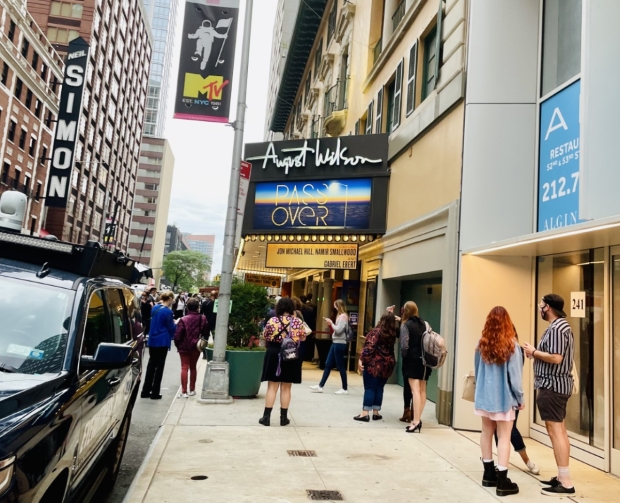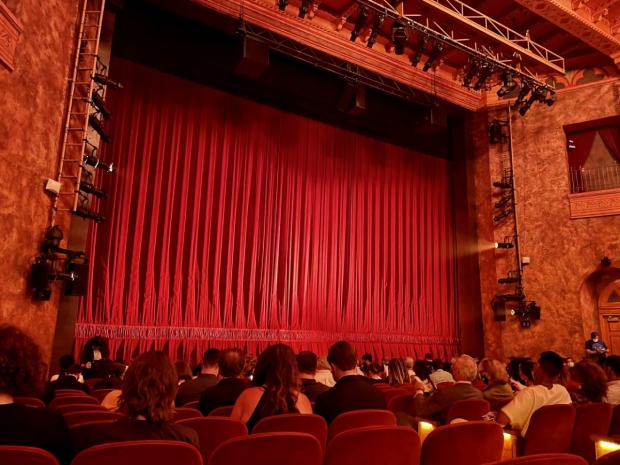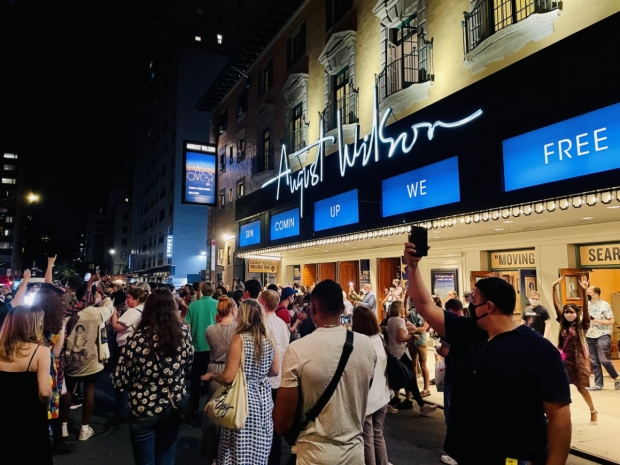Broadway Celebrates the First Night of Pass Over
A new American play by Antionette Chinonye Nwandu is the first out of the gate for the fall season on Broadway.

(© Zachary Stewart)
It really didn’t feel that different. A small crowd in front of the August Wilson Theatre gave way to an orderly line that quickly filtered through to the lobby. There was a light barrier of security at the door, but nothing compared to the baroque game of Simon Says one plays with the TSA in order to board a plane. A brief flash of my ID and my Excelsior pass got me through to the box office to pick up my tickets, which were the old-fashioned printed variety. True, the curtain rose fifteen minutes after 8pm, but this was the status quo on Broadway long before the clunky name of “Covid-19” passed anyone’s lips. The most remarkable thing about attending my first Broadway play in a year-and-a-half was just how normal it all felt.
The play in question — the first one to perform in a Broadway house after the long Covid shutdown that began in March 2020 — is Antionette Chinonye Nwandu’s Pass Over. Reminiscent of Samuel Beckett’s Waiting for Godot, the play follows two young Black men, Moses and Kitch, who occupy a street corner that might be in an American city right now, but might also be on an antebellum plantation, or perhaps Egypt in the time of the pharaohs. It premiered at Steppenwolf in 2017, arriving at New York’s LCT3 the following year. The complete cast of the LCT3 run (Jon Michael Hill, Namir Smallwood, and Gabriel Ebert) has now transferred with the production to Broadway.

(© Zachary Stewart)
The weight of anticipation hung heavily in the air during the half-hour between taking my seat and the play beginning. Everyone around me seemed giddy to just be sitting in a Broadway house, and that energy powered every second. When Nwandu and director Danya Taymor took their seats moments before curtain (with Jujamcyn President Jordan Roth in hot pursuit, documenting the moment for Instagram), you could have been forgiven for assuming that Beyoncé and Lady Gaga had just walked down the aisle arm-in-arm, so rapturous was their reception.
The most noticeable difference (because it was on my face) was the requirement that all audience members remain masked throughout the performance. I wear glasses and tend to fog, so I hold no lasting affection for my multicolored array of face coverings, and I look forward to the day I can retire them from my wardrobe. However, I understand why the landlord of an historic building in the center of Manhattan would want to shield himself from liability by requiring an extra layer of protection, even in a space exclusively reserved for the vaccinated, even when the likelihood of being hospitalized and dying from a breakthrough infection is vanishingly slim. Relatively speaking, it’s a small price I’m more than willing to pay in order to gain access to Broadway theater.

(© Zachary Stewart)
I won’t comment on the acting and production of Pass Over, which would be premature considering this was only the first preview. I will say that the most over-the-top performance of the evening came from the house, as the audience played its role with the gusto of a troupe of first-time Hollywood extras hired to play the part of a Broadway audience. Wild entrance applause delayed the start of the dialogue, and the voices of the actors had to compete with laughter and applause throughout. In the first five minutes of the play, the slightest shrug or vocal inflection from the actors was enough to send the audience into delirium, as if we were just discovering stage performance for the first time.
This first preview crowd might not end up being such an outlier in terms of enthusiasm: The play is both joyous and challenging, which makes it easy to root for. And considering that each successive audience entering the August Wilson Theatre this fall will be just as stage-starved as we were, Pass Over is likely to be received as a great breaking of the fast for weeks to come.

(© Zachary Stewart)
The performance ended with a sustained standing ovation, with the three actors returning to the stage multiple times, eventually joined by Nwandu and Taymor, who embraced the cast in a group hug.
As we filed out of the theater onto 52nd Street, we were immediately greeted by a DJ holding an impromptu block party celebrating the first performance of Pass Over, the pioneer play of Broadway’s hopefully triumphant return. Everyone seemed genuinely thrilled to be there (I know I was), buoyed by the knowledge that this is something we can do again in the world emerging after Covid: We can go out for a night of theater and dancing in New York City without fretting that we are contributing to a national health crisis.
In a year when it has become a cliché to claim that everything has changed, I think a lot of people will be surprised to discover just how much from the before times will remain in the months and weeks to come. And after such a terribly disruptive year, that feels like good news to me.

(© Zachary Stewart)









